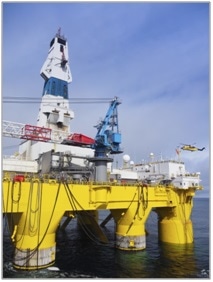Omniseal Solutions has been selected by a major U.S. oil and gas corporation to qualify its Fluoroloy® sealing solutions and polymer materials to enhance oil recovery for an ultra-high pressure field in the Gulf of Mexico, contributing chemical compatibility tests with requirements for 20,000 psi pressure (20K) valve qualification. Purpose of the testing will assess the suitability of non-metallic sealing materials in specific stimulation hydrofluoric acid fluid mixtures representative of the composition commonly used in the Gulf area.

Offshore production in the Gulf accounts for 17 percent of total U.S. crude oil output, according to the U.S. Energy Information Administration, and major offshore producers include Shell, Anadarko, BP and Chevron. Omniseal Solutions was asked to partner on the Gulf project due to their decades of experience in designing engineered sealing systems such as OmniSeal® spring-energized seals for critical valve stems and heavy R&D investment such as their Kontich laboratory expansion, related to high pressure and high temperature (HPHT) conditions where pressure rating is greater than 15,000 psi and/or temperature rating is greater than 350°F (177°C).
The testing procedure consisted of ageing material samples and complete seal stacks in a hydrofluoric acid mixture at 20,000 psi pressure and 300°F (149°C) temperature for 160 hours. Material physical property measurements were made to account for changes in tensile, hardness, mass, density, volume and deformation under load before and after exposure. Official pass and fail criteria are based, at minimum, on NORSOK M-710, edition 3 standard, which defines the requirements for critical non-metallic (polymer) sealing, seat and back up materials for permanent use in subsea, including well completion, X-mas trees, control systems and valves as well as topside valves in critical gas systems.
Carried out by a third party laboratory, the complete immersion test campaign resulted in the confirmation of each of the four Omniseal Solutions’ Fluoroloy® materials meeting the requirements of NORSOK M-710, edition 3 standard after hydrofluoric acid fluid exposure up to 300°F (149°C) temperature. In addition to these polymer materials being qualified in high pressure, high temperature and corrosive conditions, the measured physical properties after exposure will help to build degraded material models to conduct design assessment simulation on custom-designed seal stacks using Omniseal Solutions’ internal finite element analysis capabilities. Their Fluoroloy® as well as their Meldin® materials have also been approved for API 6A specification (ISO 10423, Appendix F.1.13.5.2) relating to sour fluid (FF/HH) resistance.
Aside from Fluoroloy® compounds that were evaluated, several sets of Omniseal Solutions’ custom-designed seal stacks were aged according to the same procedure for the purpose of coping with the hardware used by valve suppliers. Selected topside and subsea 20,000 psi valve suppliers for the project will perform cyclical testing of the aged seal stacks in a stem steal mock-up. Mock-up testing shall comply with the test procedure required by API 6A, Annex F, Design Validation Testing for PR2 Valves. A key benefit of mock-up testing is to pre-validate prior to a valve supplier starting full API 6A PR2 qualification on actual valves.
Production in the Gulf of Mexico is expected to reach record levels in 2019, boosted by several projects being put on stream such as Shell Appomatox. Furthermore, the outlook continues to improve with 90 potential deepwater final investment decisions this year according to analyst Westwood. This is being illustrated with recent BP final investment decision for Atlantis phase 3 development and the expected final investments decision for Chevron’s Anchor ultra-high pressure field. With this growth comes the need for new technologies such as sealing solutions, specifically for the ultra-deepwater, high-pressure reservoirs being explored for near-term development.